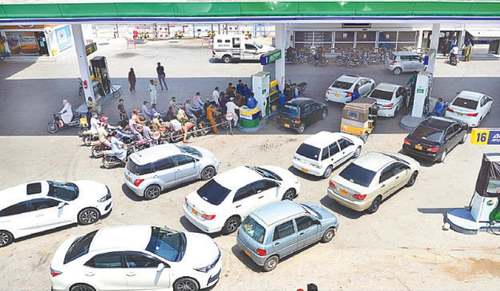KARACHI: Increase in prices of petroleum products would sabotage Prime Minister Imran Khan’s vision of lowering input cost, industry representatives said on Saturday.
Further, the industry in Karachi said gas shortages were leading to delayed manufacturing and export shipments.
Federation of Pakistan Chambers of Commerce and Industry (FPCCI) President Mian Anjum Nisar said PM Khan had announced various measures aimed at lowering input cost through Industrial Power Tariff for SMEs and cut in markup rates to seven per cent by the State Bank.
“Brent price in the international market has crossed $50 per barrel but the government can compensate industrial and general consumers by slashing the levies and taxes ratio on oil as the government has yet been charging very high petroleum levy and the GST on petroleum products,” he argued.
The FPCCI chief said that at a time when country’s GDP ratio was further stretched owing to nominal exports growth mainly due to high cost of doing business, the businesses need maximum relief.
To improve the cash flow of businesses in a challenging time due to second wave of Covid-19, the government should support the economy through decline in taxes ratio on all items including POL products, he said.
Diesel and petrol prices were Rs112 and Rs95 per litre in August 2018 when Brent price was $72 per barrel. Now in December 2020 when Brent is priced at $50 per barrel, diesel is being sold for Rs108 and petrol is set at Rs103 per litre – a clear indication that consumers were deprived from benefit of low world oil price.
The FPCCI, however, welcomed the positive step of the government to reduce petroleum levy on petrol by Rs4 per litre to Rs24 from record high level of almost Rs28 and the Rs2 per litre reduction in levy on high speed diesel (HSD).
Nisar said there is still great cushion to cut this levy further as the government is still charging a standard rate of 17 per cent general sales tax across the board to generate additional revenues while petroleum levy is slightly lower than maximum permissible limit.
“The authorities should keep in mind that the government was charging just 0.5pc GST on light diesel oil, 2pc on kerosene, 8pc on petrol and 13pc on HSD until Jan 2019. Now it is charging a total of about Rs42 per litre tax on petrol and about Rs59 per litre on HSD even after announcing a little cut in taxes,” he added.
The FPCCI office bearer said the government, for the longest time, has been charging high levy on petroleum products to minimise its revenue losses instead of letting consumers benefit fully from the reduction in global oil prices during pandemic-hit economic slowdown.
By jacking up the ratio of taxes, duties and petroleum levies, the government had deprived the consumers of relief from the plunge in global oil prices which is totally unjust.
He suggested that business-friendly policies must be adopted as other neighboring countries of the region are giving to trade and industry. “Sizeable cut in oil rates would certainly bring down the cost of doing business and local products would get their due share in the global market,” he added.
Gas pressure affecting industry
“Production activities are severely affected due to non-availability of gas The gas pressure has been zero since Thursday, making it impossible for industries to run,” Site Association of Industry (SAI) Senior Vice President Riaz Uddin.
He feared that timely shipment of export orders would not be possible. There is also a chance that foreign orders would be cancelled due to gas crisis, the SAI office bearer said.
While strongly condemning the inconsistent gas supply with the required pressure to the industries, he urged the government to ensure gas supply at full pressure to industries as promised in various meetings with the industrialists.
Before the onset of winter, several meetings with the industrialists at the government level, including PM Khan, had promised that if the industry agreed to get gas at a higher tariff, uninterrupted gas as per production demand would be ensured. “Unfortunately, despite the higher tariff, the promise of gas supply at full pressure to industries has not been fulfilled,” the SAI office bearer recalled.
Published in Dawn, December 20th, 2020













































